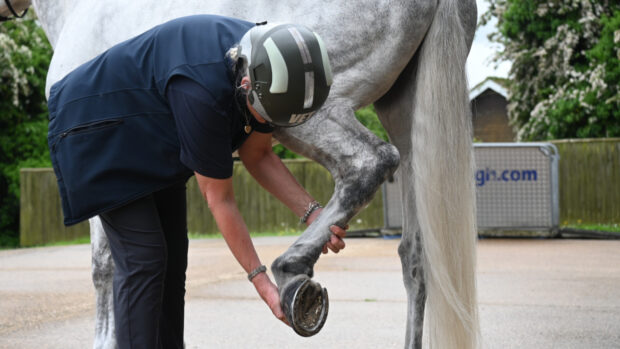Legal cases involving horses – and barristers – have highlighted the need for prospective buyers rather than sellers to engage vets for pre-purchase examinations (PPEs).
A recent Court of Appeal ruling on financial advice has relevance for the equestrian world, said Hannah Bradley of the Equine Law Firm, as it concerned a professional’s duty of care to a third party who is not his client.
The case was to do with advice given by a barrister to promoters of tax-avoidance schemes, which were sold via financial advisors to investors. The schemes failed and the investors tried to sue the barrister in relation to the advice. But the court found the barrister had no duty of care to the investors, who were not his clients.
Ms Bradley, who has recently been instructed in a case concerning a PPE, told H&H it is an established legal principle that if a vet is negligent, and that negligence causes a loss to their client, they would be liable for compensation for this. A common example is if a vet misses an issue during a PPE.
“It is sometimes the case that the seller of a horse will obtain a vet report before marketing a horse, and will share that report with prospective buyers,” she said. “If the vet who conducted the inspection for the seller has missed an issue, it is less clear whether the buyer would have a right to claim compensation against the vet.”
Ms Bradley said it is “not set in stone”, but “It appears from the law that you probably wouldn’t be able to rely on a vet report that a seller has procured.”
“It’s far better if you can procure your own PPE, so if something has been missed, you can seek recompense,” she said.
“A successful claim in negligence requires there to be a duty of care between the two parties. A vet will always owe a duty of care to their client, but may not owe one to a third party; in this case, the prospective buyer.”
British Equine Veterinary Association council member Ian Beamish told H&H that each PPE relates to the needs of that specific potential buyer, and each intended use of the horse.
“Any examination commissioned by the vendor is a general veterinary examination, not a PPE, and therefore cannot consider the specific needs of, and intended use by, multiple potential purchasers,” he said.
Mr Beamish pointed out that the vet’s aim in a PPE is to clarify that horse’s state of health and suitability for the buyer, adding: “That is what a pre-purchase examination is; a picture of the horse’s health and soundness at that single point in time.
“The exam is normally performed by a vet appointed by the purchaser and any ‘vet examination’ offered by the vendor should be regarded as conflicted as the relationship was not founded in the interest of the purchaser.”
Mr Beamish also noted that a five-stage PPE aims to be testing enough that any lameness or abnormality will be apparent, but that it cannot guarantee that the horse is fit and well, nor is it any guarantee of future health or soundness. A two-stage PPE is more limited and more conditions could be undetectable.
“Furthermore the common misconception is that the horse should ‘pass’ or ‘fail’,” Mr Beamish said. “Rather, these examinations seek to assign a degree of risk or suitability for the animal’s anticipated future. A condition that presents a high risk for athleticism does not mean it’s impossible to achieve that goal, only improbable. Likewise a high risk for a future performing grand prix dressage may in fact be low risk for a future spent regaling a paddock mate about how they could have been a star.”
You might also be interested in:

The definitive guide to the pre-purchase equine vetting

Selling a horse but worried about the vetting? Here’s how to prepare your horse

Subscribe to Horse & Hound magazine today – and enjoy unlimited website access all year round
Horse & Hound magazine, out every Thursday, is packed with all the latest news and reports, as well as interviews, specials, nostalgia, vet and training advice. Find how you can enjoy the magazine delivered to your door every week, plus options to upgrade your subscription to access our online service that brings you breaking news and reports as well as other benefits.




